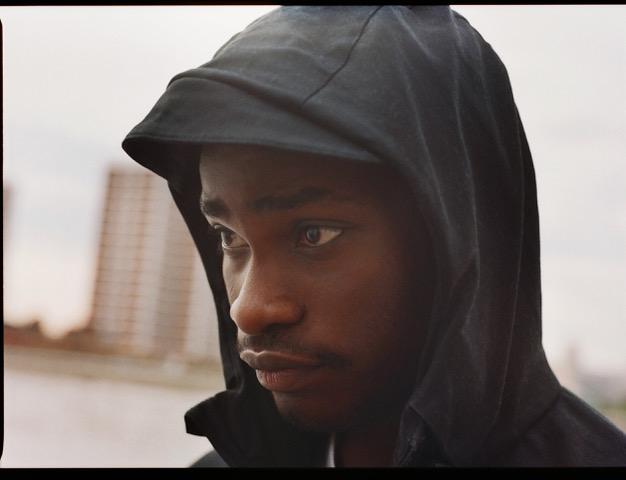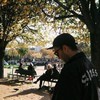This story appears in VICE magazine and Noisey's 2017 Music Issue. Click HERE to subscribe to VICE magazine.As a child, Dave never liked to fall asleep with his own thoughts. He always needed some sort of sound to color the dark silence of his bedroom. He'd drift off to scores by Hans Zimmer (which he'd discovered via the Christopher Nolan–directed Batman movies) or songs from his favorite video game, Kingdom Hearts—a Disney-flavored role-playing game about a cheery teenager fighting the forces of darkness.
Advertisement
When he turned 14, his mother bought him an 88-key digital keyboard. It occupied prime space in his bedroom. He told his friend, a kid called Kyle, and asked him to learn too. Kyle was skeptical—it wasn't normal for kids around his part of Streatham, an area of southeast London, to become aspiring pianists. But Dave convinced him.They made playing piano into a game. Every week, they chose a song to learn, and whoever played the best song won. A rivalry ignited that propelled them forward, each boy constantly scouring the internet for sheet music of songs old and new, genres strange and alien—something, anything, that would outdo or surprise the other one.If Kyle learned Lil Wayne's "Mirror," then Dave would learn Leonard Cohen's "Hallelujah." When Kyle mastered "Wind" from Naruto—a Japanese anime show they both loved about a young and mischievous orphan with a secret gift—Dave learned "Sadness and Sorrow" from the same show, a heart-swelling seven minutes of melancholic beauty. To them, it was like homework—but homework that thrilled them.They were spurred on by their music teacher at school, Alyssia Fortly, who Dave remembers as a sweet woman, and more than a teacher. She grasped that to motivate children you need to show them how music can enrich their lives. Fortly educated them on emotion, discipline, memory, technique, and imagination. And she kept kids engaged: teaching them how to play Rihanna songs instead of classical music.
Advertisement
As his abilities advanced, Dave wanted to play more than what he could find the sheet music for and taught himself how to play by ear. By listening, humming, listening, and playing, he learned underground hits like "Today" by south London rap crew 67. He was turning himself into a different type of piano player, ripping open a portal into the world of scales and improvisation.Dave wasn't really allowed to leave the house. He was the youngest of three brothers: One was in prison, and, later, the other would be incarcerated too. The family decided they couldn't risk the same happening to Dave, and between the ages of 13 and 16, he became sheltered. His keyboard was an escape, but rap became a way to vent. When he finally made his name in 2016 as one of UK music's most intriguing young prodigies, it wasn't for the piano; it was for candid freestyles that explored vulnerabilities that would make most other London MCs feel uneasy.

One of his first proper freestyles was a 2015 performance filmed for UK rap YouTube channel Blackbox. He stared down the lens of a camera in a crowded, dimly lit room and railed about how it felt to be young and surrounded by violence, to see his older brother's face in the newspaper, and to look at his mother and know from her eyes that she felt lifeless. He powerfully weaved together the story of the car breaking down as they drove to visit his brothers in prison, with the admission of his own mental breakdowns. "I never came from a broken home / The system came and broke my home," he rapped. "And now my bros are sitting in cells like chromosomes."
Advertisement
Watching it, you feel both captivated by Dave and worried for him. There's a strange and troubling irony that his gifts, as a lyrical old soul and a piano virtuoso, are probably the bittersweet fruits of his painful and isolated adolescence.In 2016, he released his debut EP, Six Paths. Although "Wanna Know" went on to be the breakthrough hit (later remixed by Drake and included on More Life), the centerpiece of the EP was "Picture Me." It is an absolute representation of Dave, with its double-time hip-hop beat and Hans Zimmer–style orchestration. It's imbued with both wisdom and anxiety, not just in the words, but also in the improvised piano chords that he recorded during free-flowing jam sessions in the studio. So rich was the orchestration on the EP, many listeners assumed that someone else wrote the piano parts. In his debut TV performance on Jools Holland's BBC1 show, he ended this speculation: playing the song while seated at a grand piano, as accomplished musicians like Paul Weller, Little Dragon, and alt-j watched on from the audience.That performance was in May. Now, Dave is 19 years old. He's ranked grade seven on the piano by the Associated Board of the Royal Schools of Music, one grade from the best you can be. He passed his driving test this past summer and made a point of driving to meet me on a mid-August day at a studio in west London. He pulled up in his first car, carefully parking it, repeatedly unsatisfied, pulling it back out and starting again.
Advertisement
We sat down in one of the recording rooms, with an unplugged electronic keyboard set up next to him. In a pristine white T-shirt beneath a black zip hoodie that partially covered a dark camouflage baseball cap, he swiveled to demonstrate anything particularly complicated about his early piano days (like what arpeggiation is or how to play the breakdown of "Passion" from Kingdom Hearts II), his fingers fluttering like ecstatic little birds.He was tired. When we talked about orchestration and production, it was like the world had rolled off his shoulders, and he could breathe again. But when I wanted to talk more generally about his career, a heavy gray cloud seemed to glaze across his eyes, and he began a cycle of removing, fiddling with, and then replacing his cap.After the success of Six Paths, he's had numerous breakout singles ("Wanna Know [Remix]," "Tequila," and "Samantha"). A galaxy of expectation is expanding around him—you don't get the attention of Drake without a few million more eyes to boot. It's not as simple as playing just for the love of it anymore, knocking out Rihanna on the keyboard with Kyle in Miss Fortly's classroom.Dave spoke uninterrupted for almost four minutes about the pressure of making music—about producing songs he and his managers and his core fans love, including enough of a story for the publicist to push, writing hooks for the radio plugger to farm, and having enough commercial appeal for him to pay everyone at the end of the week. "All of a sudden," he said, "you realize you're not making music for yourself anymore."
Advertisement
He feels the burden of his reputation as a lyricist. In Dave's opinion, it's a common misconception that writing music about your pain is somehow cathartic. "Putting yourself in the place where you need to think about that unhappiness, feel it all over again, channel it into a song, and then listen back repeatedly to how unhappy you are." He paused. "That is not the nicest thing ever."After I met Dave, I rang Fraser T. Smith. As one of the most prolific producers in the UK, he's worked with Kano, Adele, Sam Smith, Gorillaz, Plan B, and Stormzy, and since day one, with Dave. He bought him his first guitar and selected and performed in the backing band for the Jools Holland appearance. He worked with Dave on his second EP, which is out now. It wasn't ready for me to hear at the time, but Dave assured me it's very different from anything he's done before: synthetic, dreamy, and surreal. If it were a color, it would be blue, he told me—a violent blue. It's called Game Over."He puts so much pressure on himself," Smith said. "So I've tried to push him into feeling that he's more of a musician than just an artist, because I think that can be a very lonely place." He told me that when Dave writes lyrics, he disappears from the studio for days at a time, agonizing over each line, rehearsing every word repeatedly. When he returns, he frenetically delivers the entire song in just two or three takes, and they use the best one. "You get this real performance in the studio," said Smith, "which is quite an incredible thing to see."When my interview with Dave drew to an end, I asked him how long it took to master rapping and playing piano at the same time. "Ages," he said. But how long exactly? "Around two weeks."It was worth learning, though, because if the piano is going to be played live at his headline shows and TV or radio appearances, then it has to be by Dave. Yeah, he could find a million other session players to come in and do it—they might even be superior pianists—but nobody can play the chords like Dave. Because in those chords, everything he's been through and everything he's trying to say is right there in the music. It's every pressure and pain, every realization and affirmation. It's raw, uncut, and natural. "To me," Dave said, "that is what makes a performance."Joe Zadeh is a writer based in London. Follow him on Twitter.
